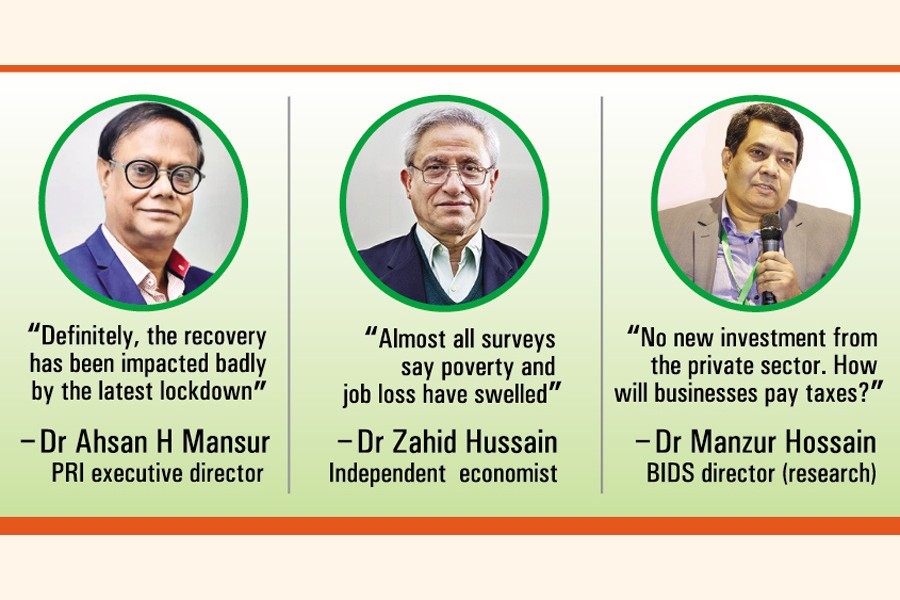The ongoing 'lockdown', enforced to curb Covid infections and fatalities, is set to cut the country's economic growth prospects for the current financial year (FY 2020-21).
The economy was in a recovery phase until the second wave of the deadly disease struck the country in early March this year.
Experts watching closely the economic developments in recent months are unable to predict in figures the possible drop in the gross domestic product (GDP) growth. But they are certain that the economy will not grow in line with the government's revised target.
The government has revised downward the GDP growth target for the current FY to 7.4 per cent from the previous projection of 8.2 per cent.
The Manilla-based Asian Development Bank on Wednesday forecast Bangladesh's GDP growth (real GDP) might range between 5.5 and 6.0 per cent this fiscal.
The lockdown in place has also fiscal implications. It shrinks revenue mobilisation and fiscal space, and widens deficits, some leading economists said while talking to the FE this week.
"Definitely, the recovery has been impacted badly by the latest lockdown," said Dr Ahsan H Mansur, executive director at the Policy Research Institute of Bangladesh (PRI), a privately-owned think tank.
The countrywide lockdown has been in place since April 05 to curb the surge in infections that stood at over 755,000 and death toll crossing the 11,000 mark as of Thursday.
The consumer spending accounts for an estimated 80 per cent of the country's GDP, making it the single-most important factor in the process of economic recovery.
" The spending has plunged because the restrictions. Shopping malls and markets were closed for 10 days. Hotels, restaurants and many other commercial and business establishments are still closed," Dr Mansur said.
Dr Mansur, who worked as division chief at the middle-east region of the IMF, said Bangladesh had been in the recovery process as the service sector and manufacturing sectors were starting to normalise.
"Although it was just shallow recovery."
The ongoing lockdown costs the travel and transport sector severely, he said, adding the service sector, which has a large share in the country's GDP, is also being impacted adversely.
Key financial services-banking and capital market-are operating for limited hours, but the transport and tourism are out of business.
Dr Mansur said the investment, mainly from the private sector, remained poor. The output in the economy and employment have been well below the desired level.
Dr Manzur Hossain, director (research) at the state-owned BIDS, said there are many fiscal risks involving the lockdown. It could result in poor resource mobilisation, higher budget deficit and increased poverty and unemployment rates.
"Look, no new investment from the private sector. How will businesses pay taxes?" he questioned.
Under the lockdown and slow pace of economic activity, public spending remained much lower at around 30 per cent of the original budget in the first six months of this fiscal.
Poor spending, needless to say, aggravates the demand.
Total public expenditure during the July-December period was Tk 1.42 trillion. Because of such poor execution of the budget, government borrowing also remained low.
The government in its original budget estimated the borrowing for the banking system at Tk 820 billion.
But it borrowed about Tk 230 billion until March.
On the other hand, the non-bank borrowing, primarily through the sale of the sanchayapatras, has increased significantly to Tk 293.1 billion in eight months to February against the yearly target of Tk 200 billion.
According to central bankers, there is no issuance of the bills and bonds leading to less than expected borrowing by the government.
Economists believe that the banking sector has adequate liquidity to feed the budget from the domestic source.
"External borrowing needs to be exploited, especially from multilateral lending institutions, to fight the economic crisis surfaced due to the pandemic and the lockdown," said Dr Hossain.
He suggested that the government focus more on health care and social safety projects in the upcoming budget.
In such a shaky situation, the government is preparing the budget for the next fiscal year by reducing its dependence on the revenue board resources.
Finance division sources told the FE that they were aware of the difficulties the people and the businesses have been encountering due to the Covid-19, saying that they would set realistic revenue targets.
They will even widen the budget deficit threshold of 5.0 per cent of the GDP in the next fiscal year.
Dr Zahid Hussain, an independent economist in Bangladesh, told the FE that there were many risks associated with a stalled economy.
"It's hard to comment on the economic losses due to the lockdown but… but it's huge…," he said.
But he said there were many studies over the past one year relating to the impact of the lockdown and the pandemic on the people and their livelihood.
"Almost all survey findings have found that poverty and unemployment swelled in the country and the poor were the main victim," said Dr Hussain who earlier served as the lead economist at the World Bank Bangladesh office.
Under the shaky economy, he said the urban low-income groups left city areas but they joined the rural labour force, resulting in contraction of wages there.
Dr Hussain, however, said this time the manufacturing sector has been kept outside the purview of lockdown.
The service sector, both formal and informal, has been impacted.


